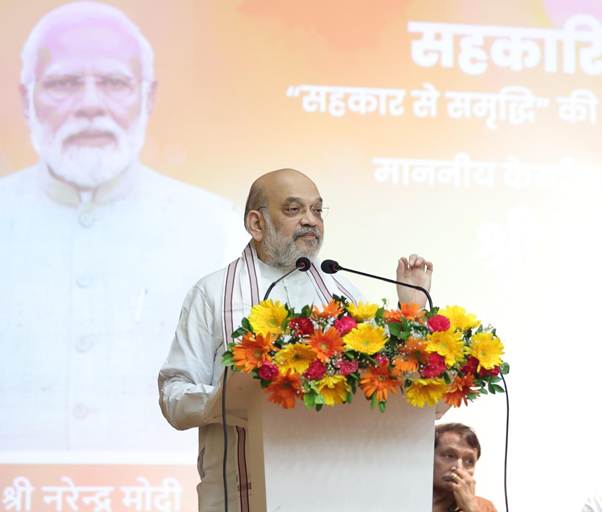Union Home Minister and Minister of Cooperation, Shri Amit Shah, unveils National Cooperative Policy - 2025 in New Delhi The National Coop...
Union Home Minister and Minister of Cooperation, Shri Amit Shah, unveils National Cooperative Policy - 2025 in New Delhi
The National Cooperation Policy is a historic step towards realizing Prime Minister Shri Narendra Modi’s vision of Sahkar Se Samriddhi
The National Cooperation Policy is visionary, practical, and result-oriented
At the core of the Cooperation Policy are villages, agriculture, rural women, Dalits, and Tribals
Cooperative societies will also be established in sectors like tourism, taxi services, insurance, and green energy through the National Cooperation Policy
By 2034, the National Cooperation Policy aims to triple the cooperative sector’s contribution to GDP, bring 50 crore active members into the fold, and connect youth with employment opportunities
30 per cent increase in the number of cooperative societies and the establishment of at least one cooperative society in every village are key objectives of the New Cooperation Policy
There was a time when people used to say, “Cooperation has no future”, Today, I say, “The future belongs to cooperation only”
Union Home Minister and Minister of Cooperation, Shri Amit Shah, today unveiled the National Cooperation Policy – 2025 in New Delhi. On this occasion, Union Minister of State for Cooperation Shri Krishan Pal Gurjar, Shri Murlidhar Mohol, Cooperation Secretary Dr. Ashish Kumar Bhutani, former Union Minister and chairman of drafting committee of new Cooperation Policy, Shri Suresh Prabhu, and many other dignitaries were present.
Addressing the unveiling ceremony of the National Cooperation Policy – 2025, Union Minister of Cooperation Shri Amit Shah said that under the leadership of Shri Suresh Prabhu, a 40-member committee has presented a comprehensive and visionary cooperation policy to the country's cooperative sector after holding dialogue with various stakeholders. The Minister of Cooperation said that for a better future of cooperation, a 40-member committee was formed, which conducted regional workshops and held extensive discussions with cooperative leaders, experts, academicians, ministries, and all other stakeholders to draft the policy. The committee received about 750 suggestions, held 17 meetings, and after consultations with RBI and NABARD, finalized the policy.
Union Minister of Cooperation Shri Amit Shah said that the new Cooperation Policy is a historic step toward fulfilling Prime Minister Shri Narendra Modi’s vision of ‘Sahkar Se Samriddhi’ (Prosperity through Cooperation). He said that the Modi government has set a goal for India to emerge as the world’s third-largest economy by 2027. Along with that, India also holds the responsibility for the inclusive development of its 1.4 billion citizens. He said that India’s core idea is to create a model in which there is a collective development for all, equitable growth for everyone, and national progress through the contributions from everybody.

Shri Amit Shah said that, almost 75 years after Independence, Prime Minister Shri Narendra Modi established the Ministry of Cooperation. At the time of its establishment, the cooperative sector was in a dilapidated state. He added that the greatest achievement of the Ministry of Cooperation — set up to fulfill Prime Minister Modi’s resolve of ‘Sahkar Se Samriddhi’— is that today, even the members of the smallest cooperative unit in the country feel pride and confidence. He said that in the past four years, the cooperative sector has stood on equal footing with the corporate sector by every measure.
Shri Amit Shah said that the Model Cooperative Village initiative was first launched in Gandhinagar, and it is an initiative of NABARD. He stated that efforts will be made to establish five model cooperative villages in every tehsil through state cooperative banks. The participation of women will be linked to this initiative through White Revolution 2.0. Shri Shah added that a roadmap has been prepared to implement all these schemes on the ground through two dedicated committees. Under the leadership of Prime Minister Narendra Modi, the Ministry of Cooperation is fully prepared to implement this policy in its entirety at the grassroots level. He noted that the policy includes key elements aimed at bringing significant transformation in the socio-economic structure of villages and ensuring that technology reaches even the smallest cooperative units over the next two decades. The computerization of processes will completely change operational methods, leading to increased transparency and efficiency. To foster competition, financial stability, transparency, and resilience to challenges in the cooperative sector, these changes will be implemented at the grassroots through a monitoring mechanism. Additionally, a system has been put in place to make necessary legal amendments every 10 years to keep the policy relevant and effective.
Union Home Minister and Minister of Cooperation said that through this cooperation policy, the goal is to make the rural and agricultural ecosystem, along with the poor of the country, a reliable and integral part of India’s economy to achieve the vision of Aatmanirbhar Bharat. He mentioned that a roadmap for balanced cooperative development has been prepared for every state. He emphasized that this cooperation policy is visionary, practical, and outcome-oriented. Shri Shah said that based on this policy, India's cooperative movement will advance steadily towards 2047, the centenary year of India’s independence. He added that the goal of ‘Sahkar Se Samriddhi’ includes not only growth in the Gross Domestic Product (GDP), but also aims at creating employment and enhancing individual self-respect. A member-centric model has been established as the foundation of this policy. He stressed that the welfare of the member should be the core objective of cooperation, and this principle has guided the formulation of the policy. The policy also focuses on creating opportunities to enhance the participation of women, youth, tribals, and Dalits in the country’s economic development.








 "
"
 "
"
 " alt="" />
" alt="" />
 " alt="" />
" alt="" />





